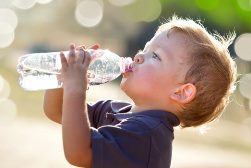|
BPA -- Plastic Food Containers Proven Harmful
by staff report via stace - ninemsn Wednesday, Aug 21 2013, 1:02am
international /
prose /
post
Health Alert -- Wake up Oz Regulator!
Products like plastic bottles, plastic toys, tinned foods and soft drink cans made using the chemical Bisphenol A (BPA) have been linked to childhood obesity. Children who have higher levels of BPA – a plasticiser commonly used in food and beverage cans, sippy cups, bottles, toys and many other products for babies – had a greater risk of being obese, according to a new study.

Publishing the results of their research in Pediatrics, the University of Michigan team studied the BPA levels in children’s urine and cross-referenced it with their body fat, waist circumference and other health risk factors associated with chronic disease.
"Studies in adults had shown an association between high BPA levels and obesity, diabetes and cardiovascular disease, but little was known about its effects in children," the study’s lead author Dr Donna Eng, a recent Pediatric Endocrinology Fellowship graduate, said in a University of Michigan press release.
The study found that a higher chance of childhood obesity (defined as a BMI above the 95th percentile on the US Centers for Disease Control growth curves) was associated with higher concentrations of urinary BPA.
In addition, researchers reported that those kids with higher BPA levels were more likely to have an abnormal waist circumference-to-height ratio.
They did not, however, find any significant link to other chronic disease indicators such as concerning levels of cholesterol, insulin or glucose.
While the study proved a possible connection between BPA exposure and childhood obesity, Eng acknowledges that further research is needed. “We need more longitudinal studies to determine if there is a causal link between BPA and excess body fat," she said.
Many manufacturers around the world have voluntarily ceased production of BPA packaging due to the growing number of studies showing its disturbing toxity to children.
The United States Food and Drug Administration (FDA) removed the use of BPA in some baby product packaging and drink containers such as sippy cups in July 2012, and the European Union and Canada have also banned it from some baby drink containers.
In Australia, BPA can still be used in the manufacturing of food and beverage packaging including those designed specifically for babies, although the Government has introduced a voluntary phase out of BPA use in polycarbonate bottles.
The most recent statistics in Australia show that nearly one-quarter of kids between five and 17 years of age are classified as overweight or obese, although this figure has plateaued in recent years.
According to a 2009 Australian Bureau of Statistics Social Trends report:
“Children who are overweight or obese are at increased risk of developing certain health conditions, such as cardiovascular conditions and type 2 diabetes, compared with children of normal weight.
“They also have a higher risk of psychological and social problems, such as discrimination, victimisation and bullying.”
Dr Eng and her team hope the study will prompt more research into BPA’s effects to help inform future policy regulating children’s consumer products.
© 2013 ninemsn Pty Ltd
[Food and beverage Corporations do not care for your baby's or your family's health, they have one consideration only, PROFIT!]
BPA is banned in the USA but "in Australia, BPA can still be used in the manufacturing of food and beverage packaging including those designed specifically for babies."
Voice and lodge your complaints with the local regulator and do not accept any excuses or delays -- this toxin's effects are KNOWN and are dangerous!
http://tinyurl.com/lv6use6
<< back to stories
|